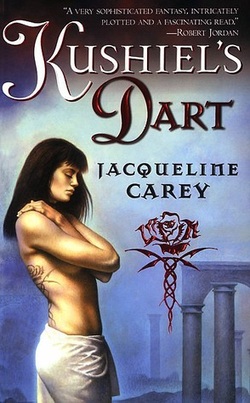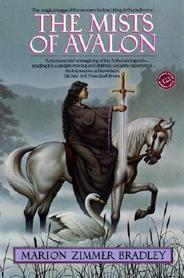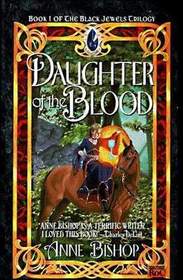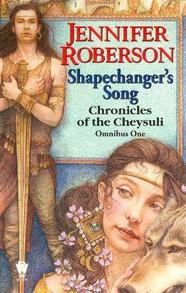
This review is for my second read of this book; I read it first in 2010. Loved it again, though I noticed a few flaws now that I didn’t then—of course, relieved of the suspense, I could dwell more on the actual writing. Still, there was much of literary merit in the book, as well as the enjoyable tale I remembered.
The story takes place in an alternate-universe France, following Phèdre, a young woman trained first at a highly-respected pleasure-house and later at the knee of a political intriguer. From the beginning, though, she is marked out from the other courtesans-to-be by a mote in her eye—the touch of the angel of pain, and a sign that she is an “anguissette,” one who derives pleasure from pain. As she comes of age and begins taking assignments, collecting information from her clients via pillow-talk and delicate manipulations of their emotions, she becomes steadily more embroiled in the conspiracies and machinations surrounding her country’s elite—and when the time comes that she knows too much, she (and her reluctant bodyguard) finds herself the target of more pain than she signed up for.
It is an easy thing, I think, for a book containing BDSM sex scenes to fall either into the "mindless erotica" or "rape glorification" categories of trash. (For example, A.N. Roquelaure/Anne Rice's Sleeping Beauty trilogy I would call "mindless rape glorification".) This book, however, is resoundingly neither of those literary sins. It is far from being mindless or, I'd argue, even erotica—the sex scenes are not nearly as explicit as one might expect, and are far overshadowed by the intricacies of the novel's many plots and subplots. And, though there is nonconsensual intercourse, the main character's reaction to it is to be thoroughly repulsed, even as her masochistic nature leads her to feel pleasure in it. In this way, as in others, the book walks a fine line, but manages to maintain a steady moral compass.
The story takes place in an alternate-universe France, following Phèdre, a young woman trained first at a highly-respected pleasure-house and later at the knee of a political intriguer. From the beginning, though, she is marked out from the other courtesans-to-be by a mote in her eye—the touch of the angel of pain, and a sign that she is an “anguissette,” one who derives pleasure from pain. As she comes of age and begins taking assignments, collecting information from her clients via pillow-talk and delicate manipulations of their emotions, she becomes steadily more embroiled in the conspiracies and machinations surrounding her country’s elite—and when the time comes that she knows too much, she (and her reluctant bodyguard) finds herself the target of more pain than she signed up for.
It is an easy thing, I think, for a book containing BDSM sex scenes to fall either into the "mindless erotica" or "rape glorification" categories of trash. (For example, A.N. Roquelaure/Anne Rice's Sleeping Beauty trilogy I would call "mindless rape glorification".) This book, however, is resoundingly neither of those literary sins. It is far from being mindless or, I'd argue, even erotica—the sex scenes are not nearly as explicit as one might expect, and are far overshadowed by the intricacies of the novel's many plots and subplots. And, though there is nonconsensual intercourse, the main character's reaction to it is to be thoroughly repulsed, even as her masochistic nature leads her to feel pleasure in it. In this way, as in others, the book walks a fine line, but manages to maintain a steady moral compass.
The theme of consent is threaded throughout the book, in and out of the bedchamber. The main precept of the country's religion is to "Love as thou wilt"—therefore, rape is not only illegal but the highest form of blasphemy. Similarly, all romantic preferences are accepted by this society, be they in contradiction to class, race, or heteronormativity—if a nobleman should fall in love with a farmboy, they could live happily together without the scorn of their peers, because their religion decrees that their love is as sacred as any other. And, outside the romantic realms, any citizen may choose his or her own path in life—and so they do, repeatedly, in the story.
Each character is undeniably distinct—they each have their own goals, and their own strategies to achieve those goals. This is laudable in any book, but particularly so in one whose list of dramatis personae is over five pages long—and you'll be glad to have that list by the time you finish the first act of the drama, believe you me. In any case, these many distinct characters with distinct goals lead to many distinct plots, each complicated and layered in its own right, interwoven into a book that is well worth the second read to catch the nuance.
Not only is this first book's structure well-done, but, from the perspective of one who has read those that follow, its foreshadowing of plots to come is particularly admirable. Some details, mentioned in the first hundred pages, seemingly unimportant, will not come into the forefront until one or two books down the line—yet they are set up here, forming a foundation of a far grander scale, even, than that of the epic adventure contained in this book alone.
I must say, however, that this tight interweaving of plot—which I cannot stop fawning over—is not maintained over the course of the series. While all of the books are of high quality, with more than their fair share of intrigue and adventure, this one, I believe, is the most well-written (as series debuts so often are). Still, Jacqueline Carey's talents—to spin an enthralling tale; to create compassionate, intelligent characters; and to build a fantastically believable world—are clear in all the books in this series. They shine through the dense shelves of contemporary fantasy, and I very much look forward to reading her other works.
Each character is undeniably distinct—they each have their own goals, and their own strategies to achieve those goals. This is laudable in any book, but particularly so in one whose list of dramatis personae is over five pages long—and you'll be glad to have that list by the time you finish the first act of the drama, believe you me. In any case, these many distinct characters with distinct goals lead to many distinct plots, each complicated and layered in its own right, interwoven into a book that is well worth the second read to catch the nuance.
Not only is this first book's structure well-done, but, from the perspective of one who has read those that follow, its foreshadowing of plots to come is particularly admirable. Some details, mentioned in the first hundred pages, seemingly unimportant, will not come into the forefront until one or two books down the line—yet they are set up here, forming a foundation of a far grander scale, even, than that of the epic adventure contained in this book alone.
I must say, however, that this tight interweaving of plot—which I cannot stop fawning over—is not maintained over the course of the series. While all of the books are of high quality, with more than their fair share of intrigue and adventure, this one, I believe, is the most well-written (as series debuts so often are). Still, Jacqueline Carey's talents—to spin an enthralling tale; to create compassionate, intelligent characters; and to build a fantastically believable world—are clear in all the books in this series. They shine through the dense shelves of contemporary fantasy, and I very much look forward to reading her other works.
Recommendations:

The Mists of Avalon,
by Marion Zimmer Bradley
This book is amazing and fantastic and if
you haven't read it yet you are a sad cretin.
A feminist retelling of Arthurian myth through the eyes of the women (particularly Morgaine), it is a cornerstone of feminist fantasy -- as well
as the most character-driven and sympathetic version of that story I've ever read. For strong ladies, complex writing, and alt-hist divine fantasy to match Carey's Kushiel series,
look here.

Daughter of the Blood,
by Anne Bishop
Bishop's Black Jewels Trilogy takes place in a world where women are the dominant sex -- a world that, in the first book, is sharply out of whack. It features a male sex slave (who's pretty thoroughly Phèdre's foil) and a young girl who happens to be the most powerful magic user ever, and consequently destined to fix everything.
It has some dark themes, but is overall a light read -- I'd call it YA, but I'm hesitant to recommend it to children.

Shapechanger's Song,
by Jennifer Roberson
This is a great series (and one I really ought
to reread...) about a country in the midst of genocide -- a race of shape-changers is being systematically hunted down. Enter Alix, a
young woman who turns out to be mistaken
in thinking herself unrelated to this problem. One thing leads to another, there turns out to be a whole big prophecy with interlocking subplots, and well, it's just a really good read.

 RSS Feed
RSS Feed





